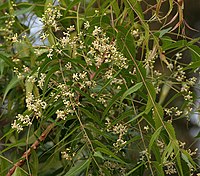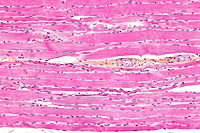
PHBV‐TiO2 mats prepared by electrospinning technique: Physico‐chemical properties and cytocompatibility
Sign Up to like & getrecommendations! Published in 2018 at "Biopolymers"
DOI: 10.1002/bip.23120
Abstract: One of the most important challenges in tissue engineering research is the development of biomimetic materials. In this present study, we have investigated the effect of the titanium dioxide (TiO2) nanoparticles on the properties of… read more here.
Keywords: tio2; tio2 mats; phbv tio2; phbv ... See more keywords

Development of a layered bacterial nanocellulose-PHBV composite for food packaging.
Sign Up to like & getrecommendations! Published in 2022 at "Journal of the science of food and agriculture"
DOI: 10.1002/jsfa.11839
Abstract: Most of the current materials used in food packaging are synthetic and non-degradable, raising environmental issues derived from the accumulation of plastics in landfills/waterways. The food industry increasingly needs eco-friendly sustainable materials that meet the… read more here.
Keywords: food; phbv; food packaging; bacterial nanocellulose ... See more keywords

Evaluating haloarchaeal culture media for ultrahigh-molecular-weight polyhydroxyalkanoate biosynthesis by Haloferax mediterranei.
Sign Up to like & getrecommendations! Published in 2021 at "Applied microbiology and biotechnology"
DOI: 10.1007/s00253-021-11508-3
Abstract: A series of culture media for haloarchaea were evaluated to optimize the production of ultrahigh-molecular-weight (UHMW) poly(3-hydroxybutyrate-co-3-hydroxyvalerate) (PHBV) by Haloferax mediterranei. Cells of H. mediterranei grew (> 1 g/L of dry cell weight) and accumulated PHBV upon… read more here.
Keywords: molecular weight; uhmw phbv; culture media; phbv ... See more keywords

The Investigation of the Toughening Mechanism of PHBV/PBAT with a Novel Hyperbranched Ethylenediamine Triazine Polymer Based Modifier: The Formation of the Transition Layer and the Microcrosslinking Structure
Sign Up to like & getrecommendations! Published in 2018 at "Journal of Polymers and the Environment"
DOI: 10.1007/s10924-018-1286-4
Abstract: A new type of designed hyperbranched ethylenediamine trazine polymer (HBETP) is successfully synthesized and characterized based upon NMR and GPC. The prepared HBETP is used to modify the poly(hydroxybutyrate-co-hydroxyvalerate) (PHBV)/poly(butylene adipate-co-terephthalate) (PBAT) blends. The effect… read more here.
Keywords: phbv pbat; hyperbranched ethylenediamine; phbv; transition layer ... See more keywords

Morphology and property changes in PLA/PHBV blends as function of blend composition
Sign Up to like & getrecommendations! Published in 2018 at "Journal of Polymer Research"
DOI: 10.1007/s10965-018-1586-3
Abstract: PLA/PHBV blends were prepared by melt mixing. The morphology and physical properties of the blends and neat polymers were investigated. Scanning electron microscopy (SEM) studies provided evidence of interfacial cavities and weak interfacial interaction between… read more here.
Keywords: phbv content; morphology; phbv; pla phbv ... See more keywords

GPTMS-Modified Bredigite/PHBV Nanofibrous Bone Scaffolds with Enhanced Mechanical and Biological Properties
Sign Up to like & getrecommendations! Published in 2018 at "Applied Biochemistry and Biotechnology"
DOI: 10.1007/s12010-018-2922-0
Abstract: Bioceramic nanoparticles with high specific surface area often tend to agglomerate in the polymer matrix, which results in undesirable mechanical properties of the composites and poor cell spreading and attachment. In the present work, bredigite… read more here.
Keywords: microscopy; phbv nanofibrous; gptms modified; bone ... See more keywords

Preparation and characterization of polyhydroxybutyrate-co-valerate (PHBV) as green composites using nano reinforcements.
Sign Up to like & getrecommendations! Published in 2019 at "International journal of biological macromolecules"
DOI: 10.1016/j.ijbiomac.2019.06.181
Abstract: This article presents the preparation and characterization of polyhydroxybutyrate-co-valerate (PHBV) nanocomposite films containing cellulose nanocrystals (CNC) and aluminum oxide nanoparticles (Al2O3) as reinforcements. The effects of adding nanoparticles on the mechanical properties, such as tensile… read more here.
Keywords: characterization polyhydroxybutyrate; valerate phbv; phbv; preparation characterization ... See more keywords

Preparation, characterization and evaluation of antibacterial properties of epirubicin loaded PHB and PHBV nanoparticles.
Sign Up to like & getrecommendations! Published in 2019 at "International journal of biological macromolecules"
DOI: 10.1016/j.ijbiomac.2019.12.049
Abstract: Poly-3-hydroxybutyrate (PHB) and poly-3-hydroxybutyrate-co-3-hydroxyvalerate (PHBV) are considered as ideal drug carriers due to their non-toxic, biodegradable and biocompatible nature. In this study, the epirubicin (EPI) was used as a model drug. The blank (PHBo, PHBVo)… read more here.
Keywords: antibacterial properties; drug loaded; drug; phbv ... See more keywords

Poly(-3-hydroxybutyrate-co-3-hydroxyvalerate) (PHBV): Current advances in synthesis methodologies, antitumor applications and biocompatibility
Sign Up to like & getrecommendations! Published in 2019 at "Journal of Drug Delivery Science and Technology"
DOI: 10.1016/j.jddst.2019.02.007
Abstract: Abstract Polyhydroxyalkanoates (PHAs) are often used for fabrication of biocompatible and absorbable medical devices due to their high biocompatibility and biodegradability. Among them, poly (-3-hydroxybutyrate) (PHB) and Poly (3-hydroxybutyrate-co-3-hydroxyvalerate) (PHBV) are the most studied members… read more here.
Keywords: poly hydroxybutyrate; hydroxyvalerate phbv; biocompatibility; phbv ... See more keywords

Madhuca indica flower extract as cheaper carbon source for production of poly (3-hydroxybutyrate-co-3-hydroxyvalerate) using Ralstonia eutropha
Sign Up to like & getrecommendations! Published in 2019 at "Process Biochemistry"
DOI: 10.1016/j.procbio.2019.09.013
Abstract: Abstract In this study, the poly (3-hydroxybutyrate-co-3-hydroxyvalerate) (PHBV) was synthesized using Madhuca indica flower extract as cheaper carbon source by Ralstonia eutropha. The Influence of fermentation parameters such as incubation time, temperature, pH and inoculum… read more here.
Keywords: indica flower; production; flower extract; phbv ... See more keywords

Improved Multicellular Response, Biomimetic Mineralization, Angiogenesis, and Reduced Foreign Body Response of Modified Polydioxanone Scaffolds for Skeletal Tissue Regeneration.
Sign Up to like & getrecommendations! Published in 2019 at "ACS applied materials & interfaces"
DOI: 10.1021/acsami.8b19929
Abstract: The potential of electrospun polydioxanone (PDX) mats as scaffolds for skeletal tissue regeneration was significantly enhanced through improvement of the cell-mediated biomimetic mineralization and multicellular response. This was achieved by blending PDX ( i) with… read more here.
Keywords: response; tissue regeneration; skeletal tissue; pdx ... See more keywords